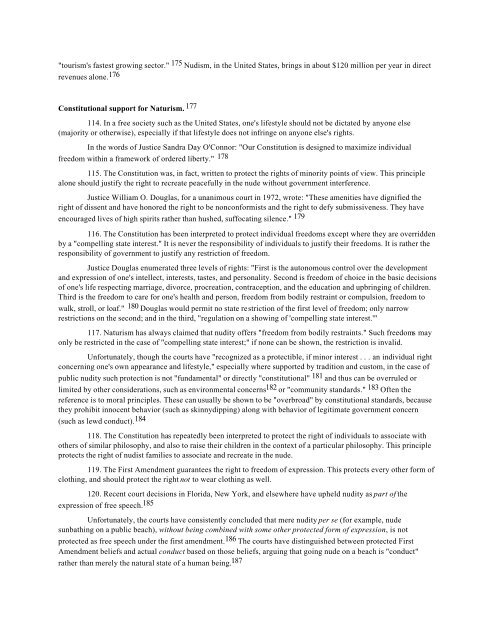Create successful ePaper yourself
Turn your PDF publications into a flip-book with our unique Google optimized e-Paper software.
"tourism's fastest growing sector." 175 Nudism, in the United States, brings in about $120 million per year in direct<br />
revenues alone. 176<br />
Constitutional support for Naturism. 177<br />
114. In a free society such as the United States, one's lifestyle should not be dictated by anyone else<br />
(majority or otherwise), especially if that lifestyle does not infringe on anyone else's rights.<br />
In the words of Justice Sandra Day O'Connor: "Our Constitution is designed to maximize individual<br />
freedom within a framework of ordered liberty." 178<br />
115. The Constitution was, in fact, written to protect the rights of minority points of view. This principle<br />
alone should justify the right to recreate peacefully in the nude without government interference.<br />
Justice William O. Douglas, for a unanimous court in 1972, wrote: "These amenities have dignified the<br />
right of dissent and have honored the right to be nonconformists and the right to defy submissiveness. They have<br />
encouraged lives of high spirits rather than hushed, suffocating silence." 179<br />
116. The Constitution has been interpreted to protect individual freedoms except where they are overridden<br />
by a "compelling state interest." It is never the responsibility of individuals to justify their freedoms. It is rather the<br />
responsibility of government to justify any restriction of freedom.<br />
Justice Douglas enumerated three levels of rights: "First is the autonomous control over the development<br />
and expression of one's intellect, interests, tastes, and personality. Second is freedom of choice in the basic decisions<br />
of one's life respecting marriage, divorce, procreation, contraception, and the education and upbringing of children.<br />
Third is the freedom to care for one's health and person, freedom from bodily restraint or compulsion, freedom to<br />
walk, stroll, or loaf." 180 Douglas would permit no state restriction of the first level of freedom; only narrow<br />
restrictions on the second; and in the third, "regulation on a showing of 'compelling state interest.'"<br />
117. Naturism has always claimed that nudity offers "freedom from bodily restraints." Such freedoms may<br />
only be restricted in the case of "compelling state interest;" if none can be shown, the restriction is invalid.<br />
Unfortunately, though the courts have "recognized as a protectible, if minor interest . . . an individual right<br />
concerning one's own appearance and lifestyle," especially where supported by tradition and custom, in the case of<br />
public nudity such protection is not "fundamental" or directly "constitutional" 181 and thus can be overruled or<br />
limited by other considerations, such as environmental concerns 182 or "community standards." 183 Often the<br />
reference is to moral principles. These can usually be shown to be "overbroad" by constitutional standards, because<br />
they prohibit innocent behavior (such as skinnydipping) along with behavior of legitimate government concern<br />
(such as lewd conduct). 184<br />
118. The Constitution has repeatedly been interpreted to protect the right of individuals to associate with<br />
others of similar philosophy, and also to raise their children in the context of a particular philosophy. This principle<br />
protects the right of nudist families to associate and recreate in the nude.<br />
119. The First Amendment guarantees the right to freedom of expression. This protects every other form of<br />
clothing, and should protect the right not to wear clothing as well.<br />
120. Recent court decisions in Florida, New York, and elsewhere have upheld nudity as part of the<br />
expression of free speech. 185<br />
Unfortunately, the courts have consistently concluded that mere nudity per se (for example, nude<br />
sunbathing on a public beach), without being combined with some other protected form of expression, is not<br />
protected as free speech under the first amendment. 186 The courts have distinguished between protected First<br />
Amendment beliefs and actual conduct based on those beliefs, arguing that going nude on a beach is "conduct"<br />
rather than merely the natural state of a human being. 187


